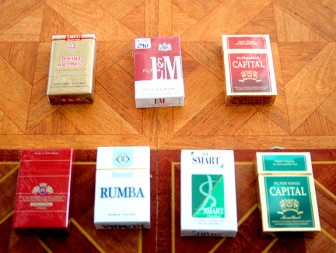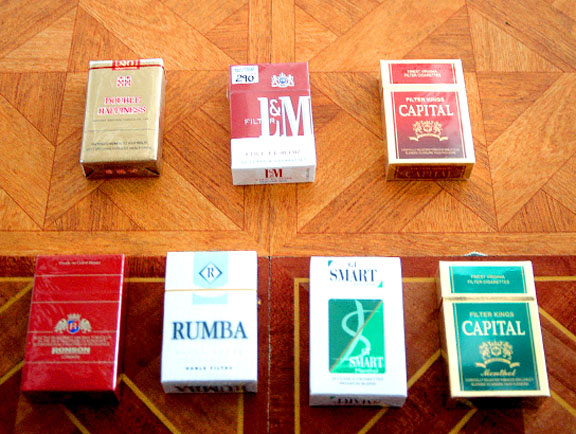The smuggling of cigarettes from Suriname into Guyana could be costing the public treasury as much as $1 billion in lost revenue according to Chief Executive of the Demerara Tobacco Company (DEMTOCO) Chandradat Chintamani.
Speaking with Stabroek Business earlier this week, Chintamni said that while the illegal cross-border entry of cigarettes manufactured in various other countries including India, China, Vietnam and countries in South America continued to render the playing field uneven for Demerara Tobacco, the more serious losses were accruing to the treasury since “the mark up that we get on cigarettes is lower than the taxes that we are required to pay to the state.
“The estimated losses resulting from the evasion of the various taxes could well exceed $1 billion when we consider that none of these importers are operating legally.”
Asked to comment on the recent call by the Guyana Revenue Authority (GRA) Commissioner General Kurshid Sattaur for the submission to the authority of verifiable information regarding the smuggling of goods into Guyana, Chintamani said that DEMTOCO had, over time, “done its own homework on smuggling” and had had exchanges with the GRA in this regard. “I am not sure how much has been done with the information that we have provided,” Chintamani said.

The DEMTOCO CEO estimates that illegal cigarette imports into Guyana could be as high as 59 million sticks annually and that there could be as many as seventy brands of cigarettes being imported into Guyana. “It’s big business. Since taxes on cigarettes, the people who smuggle cigarettes into Guyana actually make a great deal of money. We look at the prices for which some of these brands are sold. They are usually well below our own brands which come from Trinidad and Tobago and we know that given the extent of the taxes the prices at which they offer the illegally imported cigarettes reflect that fact that they paid no duty. Some smuggled brands are being sold at as much as 60% less than the legally available brands. Bristol is manufactured in Trinidad and Tobago where we benefit from favourable Caricom trading arrangements and even then our prices cannot match the smuggled cigarettes,” Chintamani said.
Chintamani explained that, on the whole, smuggling is often a “very complex process” involving a number of players, a circumstance that sometimes makes it quite difficult to trace the operations “to the top.” In the case of cigarettes being imported into Guyana, most of these are shipped from their places of origin to Suriname, smuggled overland into Guyana and distributed across the country. Stabroek Business was shown a packet of cigarettes bearing the name GT Smart which Chintamani said was being manufactured in India as a product intended for sale legally on the local market. He was unable to explain how the brand came to be caught up in the smuggling network but disclosed that DEMTOCO had already been in touch with the manufacturers about the issue.
Chintamani told Stabroek Business that while he shared the view expressed by Sattaur that both the business community and the public could play a role in helping to detect and report instances of smuggling, “the battle against smuggling cannot be won by depending solely or even primarily on outside intelligence passed to the GRA.”
 According to Chintamani, the primary responsibility for detecting and suppressing smuggling rests with the law enforcement agencies. “What is needed is a concerted approach by the authorities that includes sustained action to deal with each case of smuggling as it arises and is discovered; a more proactive approach to gathering intelligence and doing due diligence on suspected smugglers and collaboration between the authorities in Guyana and those of our neighbours and in the Caribbean. By working with our partners in the region we can secure much information on the practice outside of our borders that can help us to anticipate the manner in which the practice is likely to manifest itself here,” Chintamani said.
According to Chintamani, the primary responsibility for detecting and suppressing smuggling rests with the law enforcement agencies. “What is needed is a concerted approach by the authorities that includes sustained action to deal with each case of smuggling as it arises and is discovered; a more proactive approach to gathering intelligence and doing due diligence on suspected smugglers and collaboration between the authorities in Guyana and those of our neighbours and in the Caribbean. By working with our partners in the region we can secure much information on the practice outside of our borders that can help us to anticipate the manner in which the practice is likely to manifest itself here,” Chintamani said.
Meanwhile, according to Chintamani, the authorities would do well to consider restricting the movement of “high tax” goods, including alcohol, cigarettes, motor vehicles and electronic and electrical items between Suriname and Guyana to the ferry since those were the items that were most likely to be brought into the country illegally.
And Chintamani told Stabroek Business that loss of revenue to DEMTOCO was also occurring on account of the high level of counterfeiting of cigarettes commonly and legally sold in Guyana He said that an estimated 15 million cigarettes were believed to have been imported into Guyana during the first quarter of 2010. “Of course, apart from the loss of revenue there are also the dangers associated with consuming an illegally produced product. China is widely believed to be the location for the counterfeiting of cigarettes.





